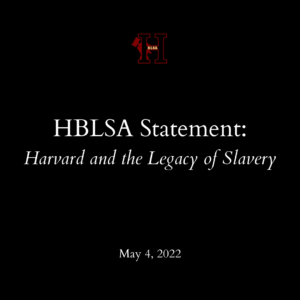 It is not a surprise that Harvard University enslaved and owned human beings. It is not a surprise that Harvard Law School was established and developed with money generated by slave labor. However, it is surprising that Harvard has taken this long to remember.
It is not a surprise that Harvard University enslaved and owned human beings. It is not a surprise that Harvard Law School was established and developed with money generated by slave labor. However, it is surprising that Harvard has taken this long to remember.
Last Tuesday, on April 26, 2022, Harvard University issued a report detailing its complicity in enslaving Africans and African Americans, calling the report “Harvard and the Legacy of Slavery.” Twenty-four hours before the release of the report, Harvard University scheduled a meeting with the leaders of Black student organizations across campus to discuss a report that we had not seen. The planning and research process failed to include the Harvard Black Law Students Association or its members, some of whom are direct descendants of enslaved people, in the conversation on how Harvard University continues to perpetuate harm to the Black community. Instead, our opinions came second to the press, demonstrating the performative nature of this institution and its response. This is the continued legacy of Harvard University, an institution that seeks to change the opinions of press rooms rather than shifting the dialogue in classrooms.
Historically, Harvard University has been willfully silent about its past. An institution that boasts of being the “oldest institution of higher learning in the United States,” founded in 1636, has taken almost 390 years to uncover and address its entanglement with slavery. The report notes that Harvard presidents enslaved people, and professors “conducted abusive research … of enslaved and subjugated human beings.” Harvard’s museum collections continue to house human remains of indigenous and enslaved people. Harvard University was not only cognizant of these records but kept custody of them. Only now has Harvard revealed the records to the general public. Harvard’s purposeful neglect is motivated by self-preservation.
This same self-preservation led Harvard Law School to recently change its crest, which previously depicted three bushels of wheat as an ode to the institution’s connection to chattel slavery. This came only after countless years of student activism. This institution has continued to demonstrate its comfortability and complacency with its endorsement of slavery and anti-Blackness. Harvard has finally taken nominal steps by recognizing its grievous history. However, what steps will Harvard take moving forward?
It is imperative that Harvard Law School recognize its role in producing agents of the law and dedicate itself to providing an environment in which Black students can succeed. Harvard cannot claim to be an institution devoted to equal justice and opportunity without working to ensure it produces alumni who further the mission of equity in the legal profession and the law. The elation and inspiration that came from the appointment of Justice Ketanji Brown Jackson, an alumnus of the Harvard Black Law Students Association, have all too quickly been shadowed by recent sorrow and fear of regression.
In light of recent news regarding Roe v. Wade, it is clear that the undertaking of justice and equality for Black people, especially Black women, is far from over. Harvard must take an active role in producing lawyers of the future, who advocate for justice over tradition, by changing the pedagogy of its classrooms. An institution that tries to reconcile its past, while simultaneously producing lawyers that perpetuate harm to the very communities with which it seeks atonement, is an unjust institution.
The Harvard Black Law Students Association is dedicated to ensuring that the release of the “Harvard and the Legacy of Slavery” report is not the apogee of recognition, but the mark of a new beginning. As we have for decades, we call upon the leaders of Harvard Law School, and Harvard as an institution, to embrace this day of reckoning. It is not enough to repent for the actions of Harvard’s past: Harvard must reconcile and rebuild for the future.
Harvard University and Harvard Law School, we are ready to engage in these conversations, and not serve as a mere afterthought. We are ready for real solutions that address the legacy of slavery –not performative actions. We are ready for buildings and hallways – not fields or rocks – to be commemorated in our names. We are ready for adequate funding to rectify the continued legacy that this institution perpetuates.
It is high time that Harvard University and Harvard Law School take the voices and advocacy of Black student organizations, not as mere inspiration, but as genuine recommendations and guidance to make certain there is equity on this campus. We ask that beyond claiming to hear us, Harvard takes the genuine step to listen to us. We acknowledge the work of the Committee on Harvard and the Legacy of Slavery. We are eager to work with Harvard Law School to honor and respect the enslaved ancestors whose forced labor and unwavering strength built this institution.
Harvard BLSA Executive Board
Dara Ferguson, President
Ariel Talbert, Internal Vice President
Daniel Walker, External Vice President
Stephen Neilson, Treasurer
Caroline Akhame, Secretary
Brenna Phillips, Chief of Staff


